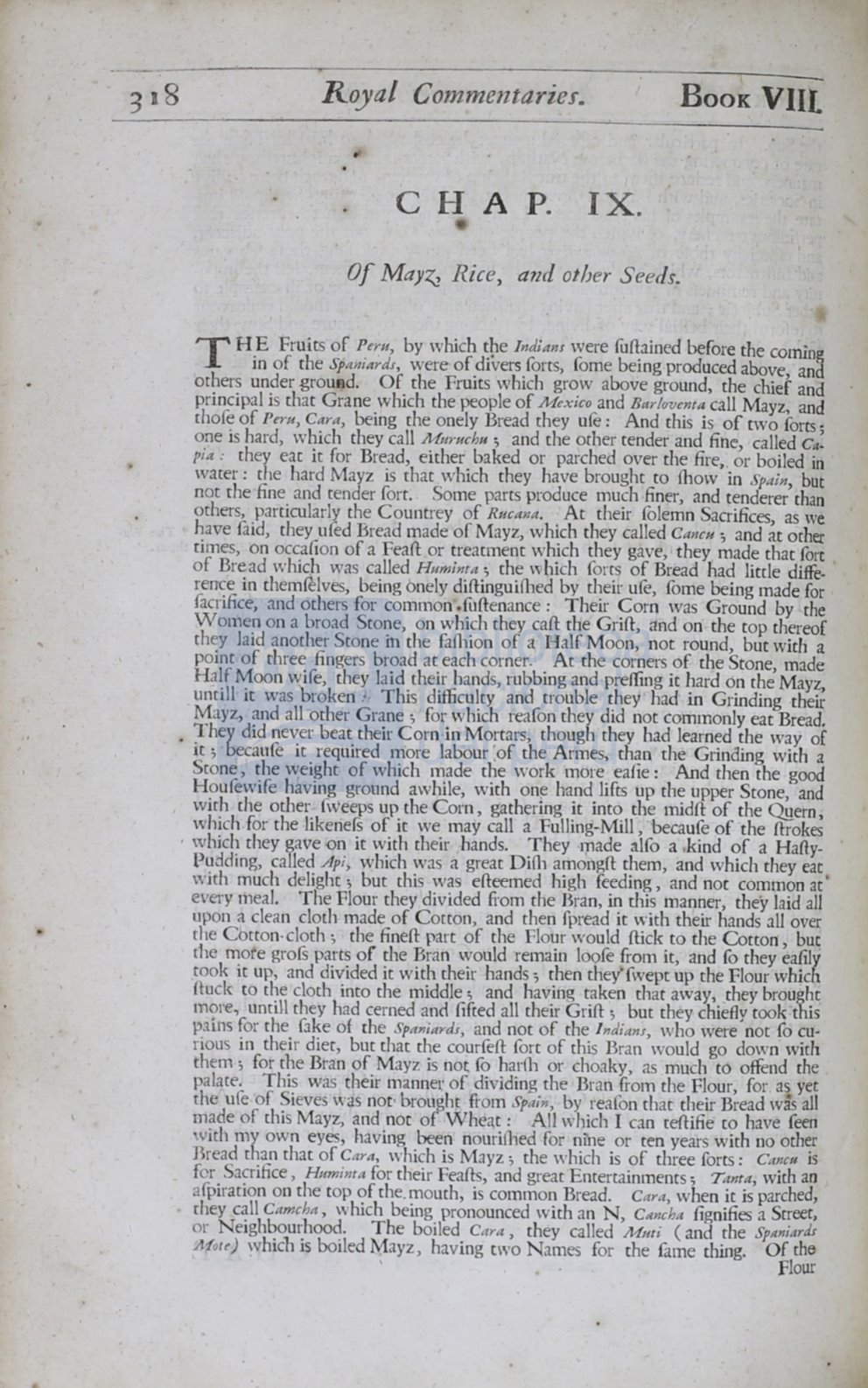

3
Royal
Commentaries.
BooK
VIIL
CH A P.
I
Of MayZJ
Rice, and other Seeds.
T
HE Fruits of
Pent,
by which tpe
Indians
were full:ained before the commg
in of the
Spaniards,
were of divers forts, fame being produced above, and
others under grou d. Of the Fruits which grow above ground, the chief and
principal
is
that Grane which the eople of
Mexico
and
Barluventa
call Mayz., and
rhofe of
Peru, Cara,
being the onely Bread they ufe: And this is of two
forts;
one
is
hard, which they call
Muruchu
;
and the other tender and fine, called
Ca–
pia :
they eat it for Bread, either baked or parched over the fire,. or boiled in
water
:
the hard Mayz is that which they have brought to !how
in
pain,
but
not the fine and tender fort.
Some parts produce much finer, and tenderer than
others, particularly the Countrey of
Rucana.
At their folemn Sacrifices, as
e
have faid, they ufed Bread made of Mayz, which they called
Cancu;
and at other
times, on occafion of a eaft or treatment which they gave, they made that
fore
of Bread which was called
Huminta;
the' hich fort of Bread had little diffe–
rence in chemielves, being onely difiinguifhed by their
u[e,
fome being made for
facrifice, and others for common .full:enance: Their Corn was Ground by the
Women on a broad Stone, on which they call: the Grifr, and on the top thereof
they laid another Stone
in
the fafhion of a
alf Moon, not round, but with a
point of three fingers broad at each corner. At the corners of the Stone, made
Half Moon wife, they laid their hands, rubbing and preffmg
it
hard on the
Mayz,
untill
it
was broken . This difficulty and trouble they had
in
Grinding their
Mayz, and all other Grane ; for
hich reafon they did not commonly eat Bread.
. They did never beat their Corn in Mortars, though they had learned the way of
it; becaufe
it
required more labour :of the Arme, than the Grinding with a
cone, the weight of which made the work more eafie : And then the good
Houfewife having ground awhile, with one hand lifts up the upper Stone, and
, with the other weeps up the Com, gathering
it
into the midfi: of the Qyern,
hich for the likenefs of
it
we may call a Fulling-Mill, becaufe of the {hokes
· which they gave -0n
it
with their hands. They made alfo a kind of a
Hafiy-
udding, called
Api,
which wa a great Difh amongfl: them, and which they eat
'·ith much delight; but this
'''a
ell:eemed high feeding, and not common at
e ery meal. The Flour they divided from the Bran,
in
this manner, they laid all
upon a clean cloth made of Cotton, and then fpread
it
with their hands all over
the
otton- cloth ; the finefr part of the
lour would fiick to the Cotton, but
rhe mo e grol.S parts of the Bran would remain loofe from
it,
and
fo
they
ealily
to k
it
up and divided it with their hands ; then they· [wept up the Flour which
uck to the cloth into the middle; and havin
taken that away, they brought
more., umill they had cerned and fifted all their Grifr ; but they chiefly took this
p ins for the fake of the
paniard.r,
and not of the
Indians,
who were not
fo
cu–
nou
in their diet but that che courfe!l: fort of this Bran would go down with
them ; for tbe Bran of Mayz is not
fo
har(h or choaky, as much to offend the
alate. This
as their manner of
di
iding the Bran from the Flour, for as yet
he ure of
ieve wa not· brought from
pain,
by reafon that their Bread wa all
made of chi Mayz, and not of
heat ;
1
which I can ce{Hfie to have feen
ith my o n eyes having been nouri1l1ed for nme or ten year with no other
:Rread than that of
Cara,
which
i
Mayz; the which is of three forts;
Cancu
is
fer
acrifice ,
Huminta
for their eafi: , and great Entertainments
5
Tanta,
with
ao
a(pirarion on the top of the.mouth
i
common Bread.
Cara,
when
it
is
parched,
they call
Cameha,
which being pronounced \ ith an
,
Cfllncha
fignifies
a Street,
r
eighbourbood.
The boiled
Cara
,
they called
Muti
(
and the
Spaniards
1ote)
\
hicb is boiled
ayz, hav·ng two
ames for the fame thing. Of the
Flour














